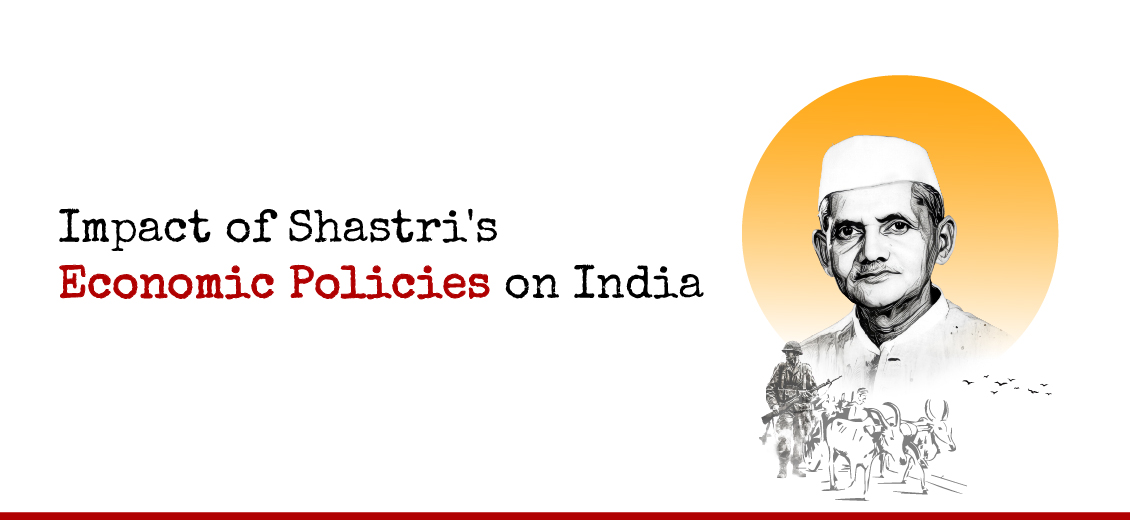Impact of Shastri's Economic Policies on India
Blogs Home
- 11 Oct 2023

Introduction
In the rich tapestry of India's history, the name Lal Bahadur Shastri may not ring as loudly as some of the other luminaries like Mahatma Gandhi or Jawaharlal Nehru. However, during his brief yet impactful tenure as India's Prime Minister from 1964 to 1966, Shastri implemented a series of economic policies that left an indelible mark on the country's development. In this comprehensive blog, we'll take a chronological journey through Shastriji's economic policies, accompanied by relevant data, facts, and his inspiring quotes, to understand their profound impact on India.
The Early Years and Economic Challenges
“The basic idea of governance, as I see it, is to hold the society together so that it can develop and march towards certain goals. The task of the government is to facilitate this evolution, this process.”
-Lal Bahadur Shastri
Lal Bahadur Shastri stepped into the shoes of the Prime Minister in 1964 amid challenging economic circumstances. India was grappling with food shortages, an ailing agricultural sector, and an industrial base that needed a significant boost. Shastri was determined to lead India on the path to economic self-sufficiency.
The Green Revolution
One of the standout achievements of Shastri's tenure was the launch of the Green Revolution. This transformative agricultural movement aimed to boost food production and decrease India's reliance on food imports, which were draining the nation's foreign exchange reserves. The government, under Shastri's leadership, introduced high-yielding crop varieties, improved irrigation systems, and modern farming techniques. The Green Revolution was nothing short of a watershed moment in India's economic history, catapulting the nation into the league of self-reliant food producers.
As Shastri famously declared, "Jai Jawan, Jai Kisan" (Hail the Soldier, Hail the Farmer). This iconic slogan captured Shastri's belief that a strong agricultural sector was as crucial as a powerful military in securing India's future.
The War and Economic Resilience
Shastri's economic acumen faced its toughest test during the 1965 India- Pakistan War. The conflict put immense strain on India's finances and resources. However, Shastri displayed remarkable resilience, ensuring economic stability even in the face of adversity.
Despite the wartime challenges, Shastri's government managed to keep the Indian economy stable, which was a testament to his leadership and commitment to economic well-being.
Fostering Economic Self-Reliance
Shastri's tenure witnessed several economic reforms aimed at bolstering India's self-reliance:
- Steel Production: Shastri recognised the pivotal role of steel in industrial development. His government encouraged the expansion of the steel industry, resulting in increased domestic production and laying the groundwork for India's subsequent industrial growth.
- Building Foreign Exchange Reserves: Shastri's policies focused on building India's foreign exchange reserves, a critical step in reducing the nation's reliance on foreign aid and stabilising the economy. Through prudent fiscal management, Shastri succeeded in increasing India's foreign exchange reserves during his tenure.
- Promoting Small-Scale Industries: Shastri's administration promoted small-scale industries and entrepreneurship, empowering individuals to start their businesses. This contributed significantly to economic growth and job creation.
- Investing in Infrastructure: Recognising the importance of infrastructure, Shastri's government invested in the expansion of transportation networks and power generation. These initiatives provided the necessary backbone for India's economic growth.
Legacy and Long-Term Impact
“We believe in peace and peaceful development, not only for ourselves but for people all over the world.”
-Lal Bahadur Shastri
The economic policies of Lal Bahadur Shastri continue to leave an indelible imprint on India's development:
- Agricultural Prosperity: The Green Revolution not only ensured food security but also laid the groundwork for agricultural growth, making India one of the world's leading food producers.
India's agricultural productivity significantly increased during and after the Green Revolution, helping to feed its growing population. - Industrial Development: Shastri's emphasis on steel production and infrastructure development played a pivotal role in India's subsequent industrial growth, steering the nation towards economic self-sufficiency.
The expansion of the steel industry and infrastructure development during Shastri's tenure contributed to India's industrial progress. - Self-Reliance: Shastri's unwavering commitment to building India's self- reliance in various sectors became a guiding principle for the nation's economic policies in the years that followed.
Shastri's vision of economic self-reliance continues to influence India's economic strategies, emphasising the importance of self-sufficiency.
His vision of a self-reliant India was not just about economic strength but also about contributing to global peace and prosperity.
Conclusion
Lal Bahadur Shastri's economic policies, often overshadowed by the towering presence of other leaders, have had a profound and lasting impact on India's economic landscape. His leadership during turbulent times, including the 1965 war, showcased his unwavering commitment to maintaining economic stability while tirelessly pursuing development goals.
The Green Revolution revolutionised India's agricultural sector, ensuring food security and laying the foundation for agricultural growth. Shastri's focus on steel production, foreign exchange reserves, small-scale industries, and infrastructure development continues to shape India's economic philosophy, serving as a poignant reminder that visionary leadership and well-conceived economic policies can indeed transform a nation's destiny. Lal Bahadur Shastri's contributions to India's economic development should be celebrated as a testament to the power of determined leadership and sound economic vision.
With these policies, Shastri laid the groundwork for India's economic progress in the decades that followed. Today, India stands as a testament to his vision of self-reliance and economic growth, honouring his legacy by striving for a prosperous and self-sufficient future.
Sources-
https://www.culturalindia.net/leaders/lal-bahadur-shastri.html
https://www.thefamouspeople.com/profiles/lal-bahadur-shastri-5289.php
Harsh Raj

Harsh Raj, a Mechanical Engineer and dedicated blogger, possesses a passion for modern art. Alongside his creative pursuits, he is steadfastly preparing for the UPSC examination, driven by a commitment to public service and governance.
Blogs Home



